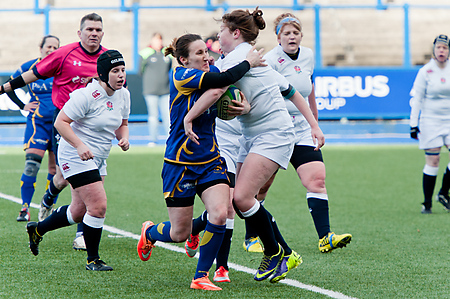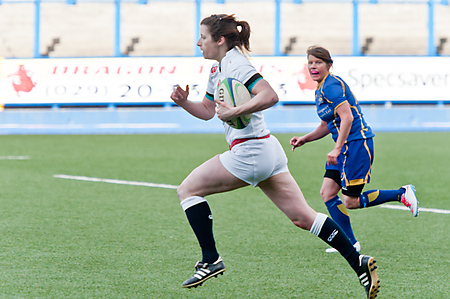Sport11th February 2015
Nurture and Dedication Key to Development of England Deaf Ladies Rugby
Drawing players from clubs all over the UK, the England Deaf Women's Rugby team, take the spoils in their first fully competitive 12-a-side match

From small acorns, giant oak trees grow, and on Saturday 31st January in Cardiff, deaf rugby started to show signs of the spreading popularity of the ladies game. With 18 of the England Deaf Rugby team rolling up for a 12-a-side match with local ladies Penalta Minerbirds, the hard work and determination of the small team behind the development of the national team, culminating in a match to savour. England Ladies Deaf Rugby are here, and they are here to play.
The ladies game in general has seen clubs popping up all over the UK with the ever-strengthening league structures and competitive matches driving up standards and the number of opportunities for ladies to play the game. However, launching a deaf ladies structure within the England set-up several years ago, the open recruitment for players has had to be resilient and dogged in approach to get to the thriving position it enjoys today.
 Requiring the same levels of deafness as the men’s game, the England Deaf Rugby Union were searching for ladies with a minimum hearing loss of an average of 25Db loss in each ear. However, with suitable players turning out for clubs in all four corners of the country, even letting people know that the England team was up and running was not straight forward, as many of the clubs may not realise that they had a player that would qualify.
Requiring the same levels of deafness as the men’s game, the England Deaf Rugby Union were searching for ladies with a minimum hearing loss of an average of 25Db loss in each ear. However, with suitable players turning out for clubs in all four corners of the country, even letting people know that the England team was up and running was not straight forward, as many of the clubs may not realise that they had a player that would qualify.
Putting in place a communication and social media strategy, slowly but surely awareness has grown and new players identified. Importantly, whilst the awareness raising has been going on, the management of the team have secured training facilities, kit, coaches and playing opportunities, and the team has blossomed because of that. Everything being done without the big money sponsorship and financial clout that is available in mainstream rugby.
 Now training regularly at Hitchin RFC, the ladies have also been treated to a ‘training weekend’ at RAF Brize Norton. It sounded more like a boot camp to me! “On the Saturday they put us through a gruelling training programme with the infamous cannon run interspersed with team building challenges,” England Captain Gina Iaquaniello told me. “This was followed by wall climbing and the next day we played a mixed touch tournament against some RAF teams as well as a local team.”
Now training regularly at Hitchin RFC, the ladies have also been treated to a ‘training weekend’ at RAF Brize Norton. It sounded more like a boot camp to me! “On the Saturday they put us through a gruelling training programme with the infamous cannon run interspersed with team building challenges,” England Captain Gina Iaquaniello told me. “This was followed by wall climbing and the next day we played a mixed touch tournament against some RAF teams as well as a local team.”
Well, as the saying goes, ‘what doesn’t kill you, makes you stronger!!’ Epitomising what this means, squad member Bex Francis had just a few words to say about Brize Norton, “It was amazing!”
Since coming together as a team, the ladies, aged between 20 and 45, have bonded well, many of the players only associating with other deaf ladies through this rugby link. Some of the ladies have hearing aids, others cochlear implants, but there are also lip-readers and BSL users. Through shared knowledge and understanding, and a great attitude to communication of course, they make it work and are sensitive to each other’s needs.
 As Gina explained, “For some of us, it’s the only time we meet, play, socialise with other deaf people and it’s great being with people who just get it.” For Bex, this involvement with other deaf girls has brought other benefits. “Being part of England Deaf rugby has meant I have come to terms with my disability. I am in an environment where I don’t feel bad for asking someone to repeat something I haven’t heard or speaking up a bit. The girls all understand as well and I’ve made some of the best mates through my involvement with the team!”
As Gina explained, “For some of us, it’s the only time we meet, play, socialise with other deaf people and it’s great being with people who just get it.” For Bex, this involvement with other deaf girls has brought other benefits. “Being part of England Deaf rugby has meant I have come to terms with my disability. I am in an environment where I don’t feel bad for asking someone to repeat something I haven’t heard or speaking up a bit. The girls all understand as well and I’ve made some of the best mates through my involvement with the team!”
This feeling of acceptance, understanding, and identity has been enjoyed by many deaf people over many years. One commentator told me, “It is one of the reasons Deaf Sport has such a long and distinguished history, and why deaf sporting opportunities have to be kept available for deaf children in the future, regardless of mainstreaming policies, hearing aid advancements, cochlear implants and future technological advances. Deaf still benefit from being with other deaf.”
 When planning to come to come to Cardiff with the men’s deaf team, the England ladies had hoped to play their first full international, but with Wales unable to field a team, arrangements were made for them to play a local but accomplished ladies team, the Penalta Minerbirds.
When planning to come to come to Cardiff with the men’s deaf team, the England ladies had hoped to play their first full international, but with Wales unable to field a team, arrangements were made for them to play a local but accomplished ladies team, the Penalta Minerbirds.
Resplendent in their England kit, and despite being drawn from clubs from around the country, it was evident from the outset, that the England Deaf team, were going to be a tough challenge for the local team, who play with each other week in, week out. Through their own hard work in training and their natural instinct to find a communication solution, the England ladies were far more reliant on hand communication than the Penalta ladies, using agreed gestures to call moves, position players and agree which player to mark.
Intent on playing good, open rugby, both teams contributed to a fine and open spectacle, although it was not for the feint hearted. Tackling with intent, trying to run over opposing players and clearing out at the rucks, the contact area, was keenly fought, with many of the girls relishing the rough and tumble that rugby provides. The players on both sides showed great commitment, with silky skills in the backs, complimenting the efforts of the hard fought battle up front.
Considering this was the first fully competitive 12-a-side game for the England Deaf Ladies, they had stamped some authority on the game and ran out worthy winners, 22 – 12, although great credit for a game played in fine spirit, goes to both teams. Scorers for England were, Bex Francis ( 2 tries), Sharn Watson (1 try), Gina Iaquaniello ( 1 conversion).

Meeting some of the England players after the game, it was clear to see that the ladies had gelled as a team both on and off the field. Asking Captain Gina about next steps, still beaming from the game she said, “We have more training sessions planned and are hoping for a home Welsh fixture. We may be taking part in a festival in Cambridge and sevens tournament over the summer.”
If anyone is interested in getting involved with England Deaf ladies, they can contact Gina at ginaiaq@hotmail.co.uk or through edru@btinternet.com

You can also get information on upcoming games and training, by following their Facebook and Twitter pages.
For anyone wishing to sponsor England Deaf Ladies, Gina would be delighted if you would get in touch, with a great opportunity for a sponsor to play a leading supporting role in the development of the ladies deaf game.
I asked both Captain Gina and Bex for a final comment to young deaf girls who might be undecided about whether to give it a go. “Come give it a go. We welcome everyone regardless of ability. We have fun. The opportunities are massive and you could end up playing for your country,” Gina replied. For Bex, the camaraderie she has found is uppermost, “You are accepted by all, which is a good feeling.”
SLFirst wishes Gina, Bex and the rest of the ladies, every success in the future and we look forward to going along to the first full international between the English and Welsh details - hopefully soon.
Article by Sarah Lawrence
posted in Deaf Sport / Sport
11th February 2015





